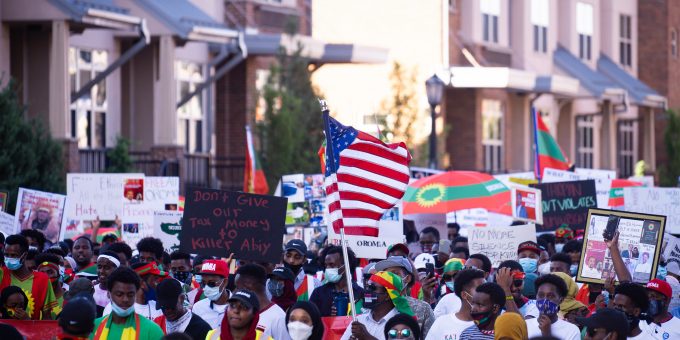
Oromo immigrants gather for a protest in Minneapolis, MN, July 10, 2020. Chad Davis, Flickr CC. https://flic.kr/p/2k1qLyw
ethnic identity and migrant communities
Migration for the sake of survival is an unfortunate reality for many. From Ukraine to Syria, individuals make the unimaginably difficult choice to settle in new nations for self-preservation. How forced migrants navigate social life following the unique experiences that compelled relocation is not well understood. What’s more, ways of reestablishing oneself in new homelands become more difficult and less understood as subnational ethnic diversity rises with migration. This lack of understanding of an increasingly common experience justifies studies into subethnic migrant communities. In a paper in Sociology of Race and Ethnicity, Beka Guluma thus investigates how immigrants negotiate between their various racial and ethnic identity options as they acclimate to American society.
Constructing her dataset, Guluma interviewed 30 first- and second-generation Oromo peoples (the largest subnational ethnic group in Ethiopia) across two American cities highly concentrated with Oromo immigrants, Washington, D.C. and Minneapolis/St. Paul, MN. The Oromo experienced nearly 150 years of political subjugation, marginalization, and cultural erasure in Ethiopia. In fleeing oppression, Oromos drew sharp distinctions between themselves and their Ethiopian compatriots while simultaneously relating on a deeper level with Black Americans. This identity alignment was punctuated by the visible emergence of the BLM movement and the nearly concurrent murders of Hachalu Hundessa (an Ethiopian-born Oromo man) and George Floyd (a U.S.-born Black man). In this way, collective experiences from two distant nations became the crucible in which a new collective identity was forged, built up from a belief in a shared project of Black liberation as a response to cultural trauma.A clear sense of home is essential to individual health and wellbeing. This study’s findings affirm the ways uniting under calamity and unexpected circumstances can foster affinity across diversity. At a time when forced migration for myriad reasons has become common, the Oromo demonstrate that tragedy and trauma may also lead to belongingness and the reconstruction of a sense of home and family.

Comments 1
mango
January 29, 2024great post ❤️